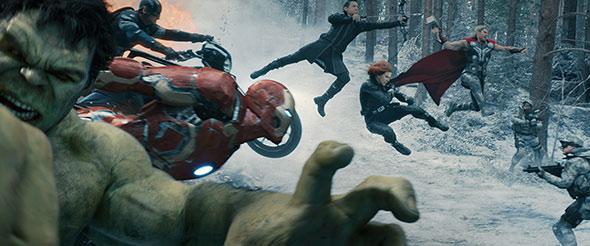Sure, I was one of the $187.7 million’s worth of Americans who bought tickets to Avengers: Age of Ultron this weekend. Sure, I enjoyed the intragroup banter and the rollicking action. (My favorite Avengers fight move is when Captain America flings his shield at bad guys, especially after Thor has used his hammer Mjolnir to supercharge it with lightning. Never has ultimate Frisbee—or carpentry—looked so impactful.) But the movie did nothing to dispel the central confusion I’ve always had with the unstoppable Marvel franchise: Why are they called the Avengers? What are they avenging?
In this movie: Nothing, really. In the previous Avengers movie: Also nothing. In the original comics? According to this Quora answer, which is barely an answer at all, nothing, really. Please don’t quote me Tony Stark’s line, the one from The Avengers, in which Iron Man attempts a mission statement while threatening the evil demi-god Loki. “If we can’t protect the earth, you can be damn sure we’ll avenge it,” he says, trying to dissuade Thor’s adopted brother from invading New York City with his alien army. But Loki does invade, and the team does manage to protect the earth, in an epic battle that costs many civilian lives. Are the Avengers’ subsequent fights retaliation for that carnage? Is that what they’re avenging?
Nah. For one thing, the villains keep changing. With Loki out of the picture (sort of) by the end of Thor: The Dark World, Age of Ultron’s baddies range from a remnant of Hydra, the Red Skull’s already-moribund-seeming Nazi organization, to Ultron himself, a malevolent bot who wants to save the human race by wiping it out, thereby precluding the possibility of any more Marvel movies. (Good luck with that one.) And anyway, the Avengers already had their name by the time Loki and Iron Man started trash-talking, despite the fact that both individually and as a group the heroes specialize in averting threats, not chasing down wrongdoers to make them suffer. In fact, in Marvel movies, it’s the villains who obsess over vengeance, far more than Nick Fury’s high-minded crew. Loki wants to get back at Thor for being the golden child to his disfavored black sheep. And in Captain America: The Winter Soldier, the eponymous killer craves comeuppance for his former war comrade, Steve Rogers, who wouldn’t know an ignoble impulse if it bit him on the bicep.
If possible, Age of Ultron is even more defiantly not about Avengers avenging than previous flicks starring Avengers. Its great moral dilemma revolves around protection and stewardship: Stark wants to use risky AI technology to “put a suit of armor on the world,” whereas Captain America fears the repercussions of creating unnecessary weapons. A huge number of the Avengers’ exploits in Age of Ultron come down to defending civilians, whether that means pulling their cars out of free-fall or evacuating them off a floating island before it explodes. In this version of the Marvel universe, even virtuous punishment is not a sufficient motive for violence. Acts of war are only justified if they prevent the future wronging of innocent people. (Well, perhaps Paul Bettany’s Vision, the incarnated J.A.R.V.I.S., annihilates Ultron because Ultron tried to murder him in computer form, though I’m sure the purple-skinned savior would claim loftier motives.)
Age of Ultron’s moral orientation is admirable—but actual avenging is nowhere to be seen. The film has almost nothing in common with the typical revenge story. Edmond Dantès and Orestes and John Wick were consumed by the bloodthirsty desire to make their enemies pay. Their “justice” was a private, impassioned, vindictive thing, a matter for the Erinyes, winged furies with whips and plague-ridden breath. Law and order? Not really a priority.
Joss Whedon! Scribe of snappy dialogue and director of Shakespeare! You know that words have meanings. You cannot call people Avengers if they do not avenge things, any more than you can identify your stove as a dishwasher or your auto mechanic as the Attorney General of the United States. Have words somehow harmed you, that you now betray them so? Was it outright hostility to the Oxford American Dictionary that made you allow the Maximoff twins onto the team only after they renounced their scheme to make Tony Stark pay for the murder of their parents? That predicated Quicksilver and Scarlet Witch’s membership in the Avengers, in other words, on them not being avengers?
It’s maddening. Especially when you consider the many apt names for analogous groups of superheroes—The Fantastic Four, the X-Men, the Justice League—Avengers-gate cries out for redress. Vengeance, even. Because if we can’t protect the English language, you can be damn sure we’ll avenge it.
